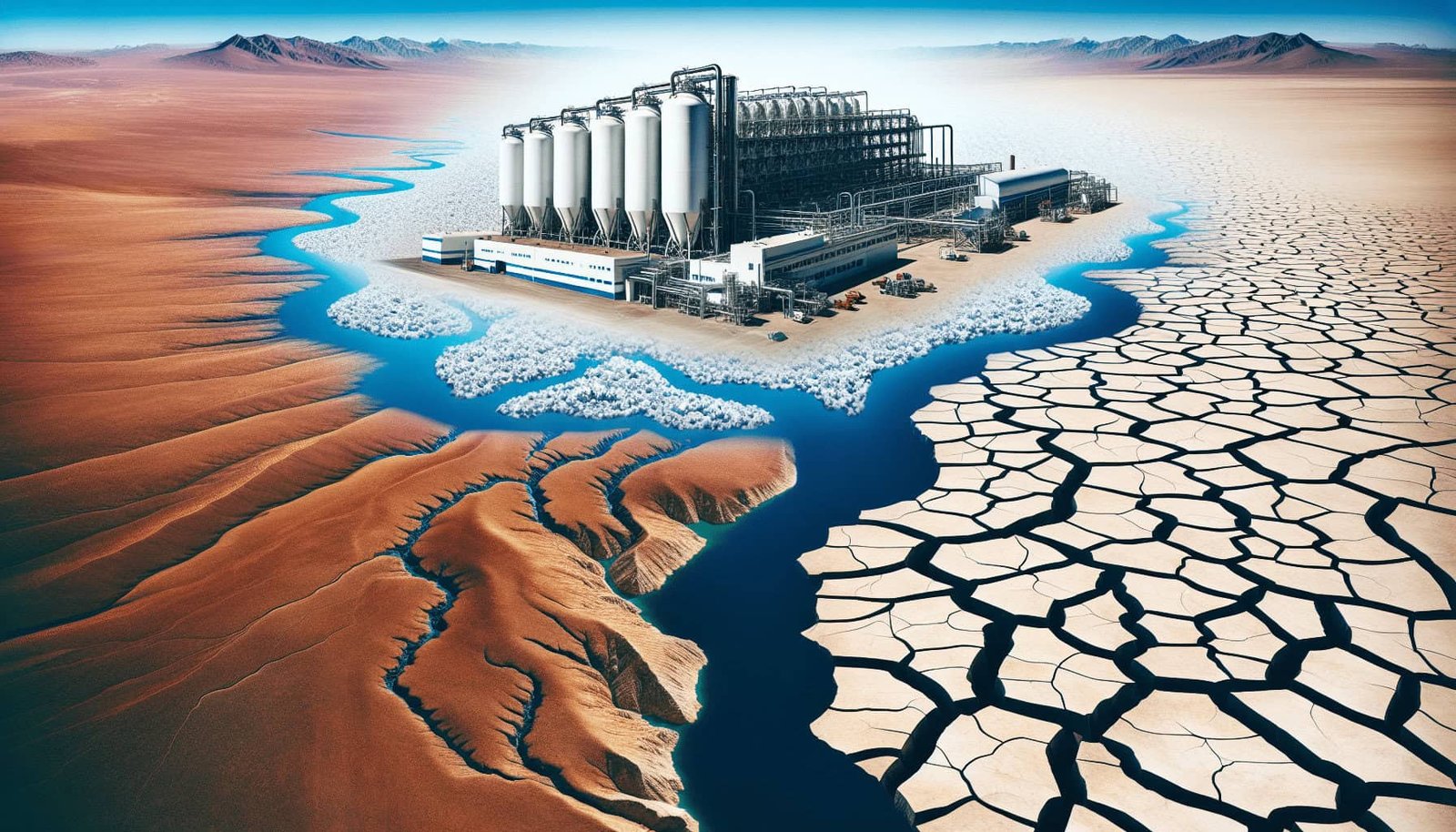In “Opinion | A Saudi Arabian Dairy Giant in Siphoning Off Arizona’s Groundwater,” author Natalie Koch highlights the alarming issue of a major Saudi Arabian dairy company extracting significant amounts of groundwater from Arizona, drawing attention to the broader implications for local communities and ecosystems. You delve into the complexities of water rights, the economic benefits to agricultural giants, and the sustainability concerns that arise from such practices. Koch not only presents a well-researched perspective on water management but also questions the ethics and long-term effects of this cross-continental water usage, making it a compelling read for anyone concerned about environmental stewardship and corporate responsibility. Have you ever wondered about the complexities of water management, especially in arid regions like Arizona? How about the implications when a foreign entity, particularly a major dairy company from Saudi Arabia, seemingly taps into these vital resources? It’s a topic worth exploring, as it significantly impacts local communities, economies, and environments. So, let’s dive into this intricate issue to understand what’s happening and why it matters.

The Controversy
The story centers around a Saudi Arabian dairy giant, Almarai, which has garnered substantial attention due to its operations in Arizona. At the heart of the matter lies the use of groundwater for agricultural purposes. Almarai has made strategic moves to grow alfalfa in Arizona, a water-intensive crop essential for dairy farming back in Saudi Arabia.
Why Arizona?
One might ask, why would a Saudi company choose Arizona for its agricultural operations? The answer lies in the stark contrast between the water resources of Saudi Arabia and Arizona. Saudi Arabia, predominantly a desert nation, has exhausted much of its renewable water resources. In contrast, Arizona, while facing its own water scarcity issues, offers more reliable groundwater sources, relatively affordable land, and favorable farming conditions for alfalfa.
Historical Context
To fully grasp the controversy, it’s essential to look at the historical context of water management in both regions.
Water in Saudi Arabia
Saudi Arabia’s aggressive water extraction methods have led to significant depletion of its groundwater. Techniques such as deep well drilling and the use of fossil aquifers have long supported the nation’s agricultural ambitions. However, these practices have unsustainable impacts, prompting Saudi businesses like Almarai to look globally for water-rich lands.
Arizona’s Water Situation
Arizona itself is no stranger to water issues. The state’s water management strategies have evolved to cope with the increased demand spurred by agriculture, urbanization, and population growth. Arizona relies heavily on both surface water from the Colorado River and groundwater reserves. It has also engaged in extensive water rights management to mitigate its aridity.
The Mechanics of Groundwater Siphoning
So, how is Almarai accessing Arizona’s groundwater? Let’s break down the mechanics of their operations to understand the scope and implications.
Land Acquisition
Almarai has purchased thousands of acres of land in Arizona, primarily in the La Paz County area. With this land, they have acquired water rights, which include the right to pump groundwater for agricultural use.
Farming Practices
The chosen crop, alfalfa, is highly water-intensive. It demands regular irrigation, which places significant strain on the local groundwater supply. The alfalfa grown in Arizona is then shipped back to Saudi Arabia to feed dairy cows, effectively exporting Arizona’s water in the form of an agricultural product.

Environmental Impacts
The environmental implications of this practice are far-reaching.
Groundwater Depletion
The extraction of groundwater at such high volumes can lead to depletion of aquifers, which are critical for maintaining water supplies during droughts. Depleting these reserves can have long-term consequences, including lower water tables and reduced water availability for local use.
Soil and Ecosystem Health
Intensive irrigation practices can alter the soil composition and affect the local ecosystem. Over-irrigation may lead to soil salinization, which degrades the land’s agricultural potential over time. Additionally, local flora and fauna, which rely on natural water cycles, can be significantly impacted.
Economic Aspects
Let’s not forget the economic nuances that play a considerable role in this situation.
Local Economy
While Almarai’s operations create some local jobs and contribute to the economy through land purchases and taxes, the broader economic implications raise concerns. The prioritization of foreign agricultural interests over local water needs could undermine long-term economic sustainability for Arizona’s agricultural sector and residential communities.
Water Pricing and Allocation
Water rights and pricing are contentious issues. Typically, ground and surface water pricing does not fully reflect the scarcity and value of the resource, leading to policies that may favor high water use by agriculture. The allocation of these water rights to foreign entities adds a layer of complexity and contention.
Legal and Regulatory Dimensions
Considering the legal frameworks governing water rights can provide more clarity on how such scenarios are possible.
Water Rights in Arizona
In Arizona, water rights are governed by a combination of state laws and local water management strategies. Water rights can be purchased along with land, which means that foreign entities like Almarai can legally access large quantities of groundwater.
Regulatory Loopholes
Some argue that current regulations have loopholes that allow for the over-exploitation of water resources. While Arizona has measures like the Groundwater Management Act to regulate water use, enforcement and coverage are sometimes insufficient to address the nuances of foreign agricultural investments.
Public Opinion and Advocacy
Public opinion is varied and often vocal regarding this issue. Local communities, environmental groups, and policymakers have actively engaged in dialogue and advocacy, notably:
Community Concerns
Local residents are worried about the long-term availability of water for their own needs, including drinking water and small-scale agriculture. The siphoning of groundwater by a foreign company feels like an injustice to many, especially in a state that already contends with water limitations.
Environmental Groups
Environmental activists are pushing for tighter regulations and better stewardship of Arizona’s water resources. They argue for a balanced and sustainable approach to water management that doesn’t sacrifice local needs for foreign agricultural interests.
Looking Towards Sustainable Solutions
To move forward, it’s imperative to explore sustainable solutions that address the needs of all stakeholders involved.
Strengthening Regulations
Tightening regulatory frameworks to prevent over-exploitation of groundwater can be a significant step. This might include setting more stringent limits on water extraction and improving the mechanisms for monitoring and enforcing these limits.
Transparent Water Management
Transparency in water management policies can ensure that local communities are fully aware of how much water is being extracted and used, and by whom. This could help foster informed public discussions and policy decisions.
Alternative Agricultural Practices
Promoting agricultural practices that are less water-intensive might provide a middle ground. This could involve incentivizing crops that require less water or advancing agricultural technology to conserve water more effectively.
International Cooperation
Between Arizona and Saudi Arabia, international cooperation is key. Both regions face unique challenges related to water scarcity, and sharing knowledge, technology, and innovative practices could benefit both.
Conclusion
At the heart of the issue concerning Almarai’s siphoning of Arizona’s groundwater lies a broader debate on sustainable resource management, national versus international interests, and the future of agricultural practices in water-scarce regions. As we navigate these waters, it’s crucial to focus on collaborative, transparent, and sustainable approaches that can ensure the fair and prudent use of our most precious resource: water.
